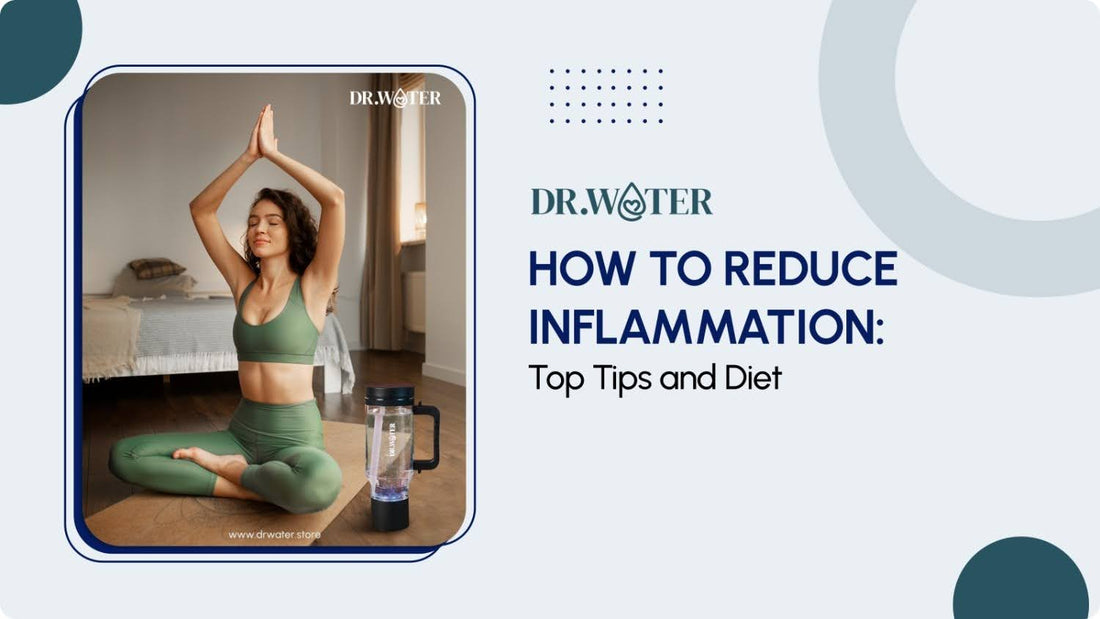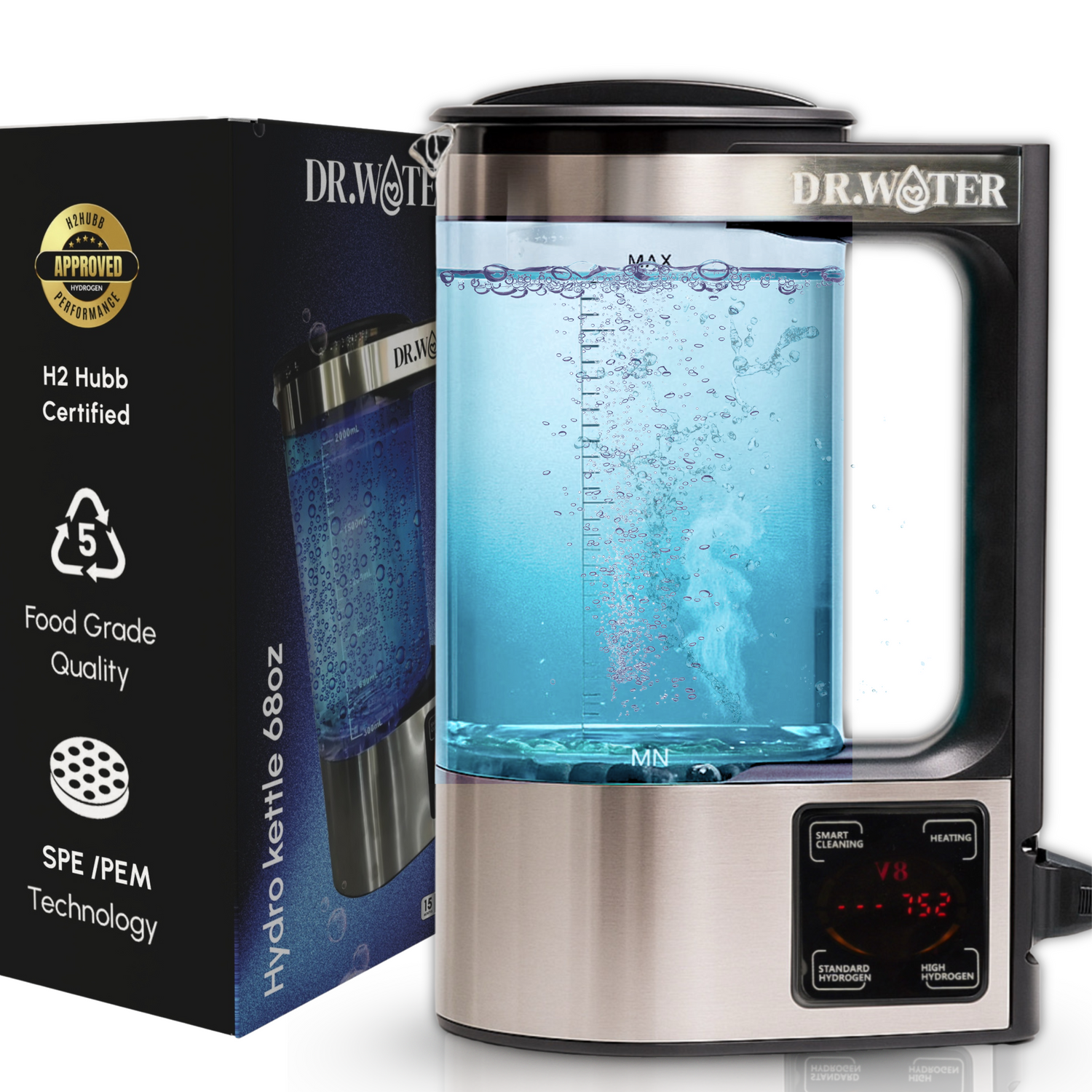
How to Reduce Inflammation: Top Tips and Diet
Share
Summary
|
A swollen ankle after a fall heals in days, but the kind of inflammation that lingers silently inside the body can last for years. This difference matters more than most people realize.
Inflammation is the body’s natural defense. Acute inflammation is a short-term response that helps repair injuries or fight infections, whereas chronic inflammation persists and gradually harms tissues.
Studies link chronic inflammation to heart disease, type 2 diabetes, arthritis, and certain cancers. Unlike the healing response, this ongoing form quietly undermines overall health.
That’s why keeping inflammation under control is vital. This article explains how daily choices and diet can lower inflammation and protect long-term wellness.
What Fuels Ongoing Inflammation in the Body

Inflammation doesn’t always come from cuts or infections. Factors such as what you eat, how you move, your stress levels, and the air you breathe can all contribute to chronic inflammation.
Understanding these triggers makes it easier to take steps to lower them.
1. Diets High in Sugar, Processed Foods, and Omega-6 Fats
Consuming excessive amounts of sugary foods, packaged snacks, and oils rich in omega-6 fats can exacerbate inflammation in the body. These foods raise markers that signal your immune system to stay active, which, over time, can harm your health.
2. Sedentary Lifestyle, Chronic Stress, and Sleep Deprivation
Sitting too much, dealing with constant stress, or not getting enough sleep can all trigger inflammation. These habits cause your body to produce more inflammatory chemicals, which can impact your energy, mood, and overall wellness.
3. Environmental Exposures: Pollution and Smoking
Breathing polluted air or smoking introduces harmful substances that trigger a defensive response in your body, leading to increased inflammation. Over time, these exposures can contribute to health problems affecting the heart, lungs, and overall well-being.
Knowing what fuels inflammation is just the first step. What you choose to eat daily can either worsen or help calm it. Incorporating the right foods can actively reduce inflammation and support overall health.
Everyday Foods That Help Reduce Inflammation
You don’t need exotic supplements to calm inflammation. Your kitchen already has plenty of options. Certain everyday foods can gently reduce inflammatory markers while supporting energy, digestion, and overall wellness.
Let’s look at some of the most effective foods you can include in your daily meals to keep inflammation in check.
- Fruits, vegetables, and leafy greens: Brightly colored produce like berries, spinach, kale, and broccoli are packed with antioxidants and plant compounds that actively counter inflammation.
- Omega-3-rich foods: Fatty fish such as salmon, plus flax and chia seeds, provide omega-3s that help lower inflammatory chemicals in the body.
- Spices and teas with anti-inflammatory properties: Turmeric, ginger, and green tea contain natural compounds like curcumin and catechins that support a calmer immune response.
- Nuts, seeds, and whole grains: Almonds, walnuts, pumpkin seeds, oats, and brown rice supply fiber and healthy fats that reduce inflammatory stress and promote digestive balance.
Eating the right foods is only half the battle. Knowing what to limit can prevent inflammation from creeping back in.
What to Limit to Keep Inflammation in Check
Everyday habits and dietary choices can silently push the body toward chronic inflammation. While the effects may not be immediately visible, over time they influence energy levels, immunity, and overall organ function.
Understanding which triggers matter most makes it easier to make targeted changes. The table below summarizes the main factors to limit.

Also Read: Hydrogen Water's Role in Improving Glycemic Control and Diabetes
Limiting these triggers reduces hidden stress on the body and helps maintain balance. Pairing restraint with intentional, supportive habits can strengthen immunity, energy, and long-term health.
Lifestyle Practices and Tips to Reduce Inflammation
Inflammation can quietly build over time, even without obvious symptoms. Everyday choices, from movement to rest, affect how the body responds to stress and repairs itself. By intentionally shaping habits, you can actively support your body’s balance and resilience.
Key practices to actively reduce inflammation:
- Regular Physical Activity: Include both cardio and strength exercises to lower inflammatory markers and support metabolism.
- Stress Management: Practices like meditation, deep breathing, or mindfulness help reduce stress-driven inflammation.
- Sleep Optimization: Prioritize 7-8 hours of quality sleep to regulate immune function and support tissue repair.
- Maintaining a Healthy Weight: Keeping weight in a healthy range reduces chronic low-grade inflammation.
- Simple Meal Planning: Preparing meals with anti-inflammatory ingredients makes healthy choices easier to stick to.
- Food Pairing for Better Absorption: Combine certain foods, like turmeric with black pepper, to maximize nutrient benefits.
- Gradual Lifestyle Adjustments: Introduce changes step by step. Small, consistent improvements are more sustainable than drastic overhauls.
Also Read: Joe Rogan and Hydrogen Water Health Advice
Building these habits creates a strong foundation for reducing inflammation, but small, targeted additions can further enhance the body’s natural defenses. One such approach involves incorporating hydrogen-rich water into your daily routine.
Integrating Hydrogen-Rich Water into an Anti-Inflammatory Routine
Hydration does more than quench thirst. It helps the body repair cells, clear toxins, and maintain inflammation control. When water supports these processes, it eases unnecessary strain on the body.
Hydrogen-rich water builds on this by adding antioxidant support. Research shows it may help neutralize harmful free radicals, which are closely tied to chronic inflammation and cellular stress.
This approach turns hydrogen-rich water from a concept into a convenient daily practice, with tools like the HydroStanley bottle making it easy to enjoy antioxidant support anytime, anywhere.
Supporting Daily Hydration with Dr. Water HydroStanley

Dr. Water makes hydrogen-rich hydration simple and convenient for everyday life. The HydroStanley 32oz Premium Bottle offers portable, antioxidant-rich water without the need for complex devices.
Key features include:
- High Hydrogen Concentration: infuses water with up to 3000 ppb in minutes for antioxidant support.
- Durable & Portable: BPA-free, lightweight, and built for daily use at home, the office, gym, or on the go.
- Rechargeable Power: long-lasting battery with multiple hydrogen cycles per charge.
- Ease of Use: a simple fill, activate, and drink process with no plumbing or setup required.
- Safe & Certified: made from FDA-approved materials and verified through third-party testing.
Backed by a 3-year extended warranty, HydroStanley makes it easy to incorporate hydrogen-rich hydration into your daily routine, supporting antioxidant intake and overall wellness.
Experience daily antioxidant support - shop the HydroStanley 32oz now!
Conclusion
Daily choices in diet, movement, stress management, and sleep shape inflammation levels and overall wellness. Consistent, small adjustments, like eating anti-inflammatory foods, staying active, and prioritizing rest, build long-term benefits.
Monitoring progress and adjusting habits mindfully keeps these changes sustainable. For those seeking an extra boost, integrating functional hydration, such as hydrogen-rich water from Dr. Water, can complement these lifestyle strategies and support overall balance.
Boost your daily wellness - shop HydroStanley 32oz today!
FAQs
Q: Can inflammation be influenced by the time of day I eat?
A: Yes. Emerging research suggests that meal timing and maintaining a regular eating schedule may affect inflammation levels. Skipping meals or eating late at night can disrupt circadian rhythms, which can influence immune responses.
Q: How does gut health relate to inflammation beyond diet?
A: A balanced gut microbiome produces compounds that regulate the immune system and inflammation. Probiotics and fiber-rich foods help maintain this balance, reducing the risk of chronic inflammatory conditions.
Q: Are there environmental triggers of inflammation at home or workplace?
A: Yes. Factors like poor indoor air quality, mold, dust, or exposure to household chemicals can contribute to low-grade inflammation. Proper ventilation, air purifiers, and minimizing chemical exposure can help.
Q: Can hydration alone affect inflammation?
A: Staying well-hydrated helps the body flush out toxins and maintain cellular repair, which indirectly reduces inflammatory stress. Hydrogen-rich water, such as from the HydroStanley bottle by Dr. Water, provides additional antioxidant support that may further help manage inflammation.

